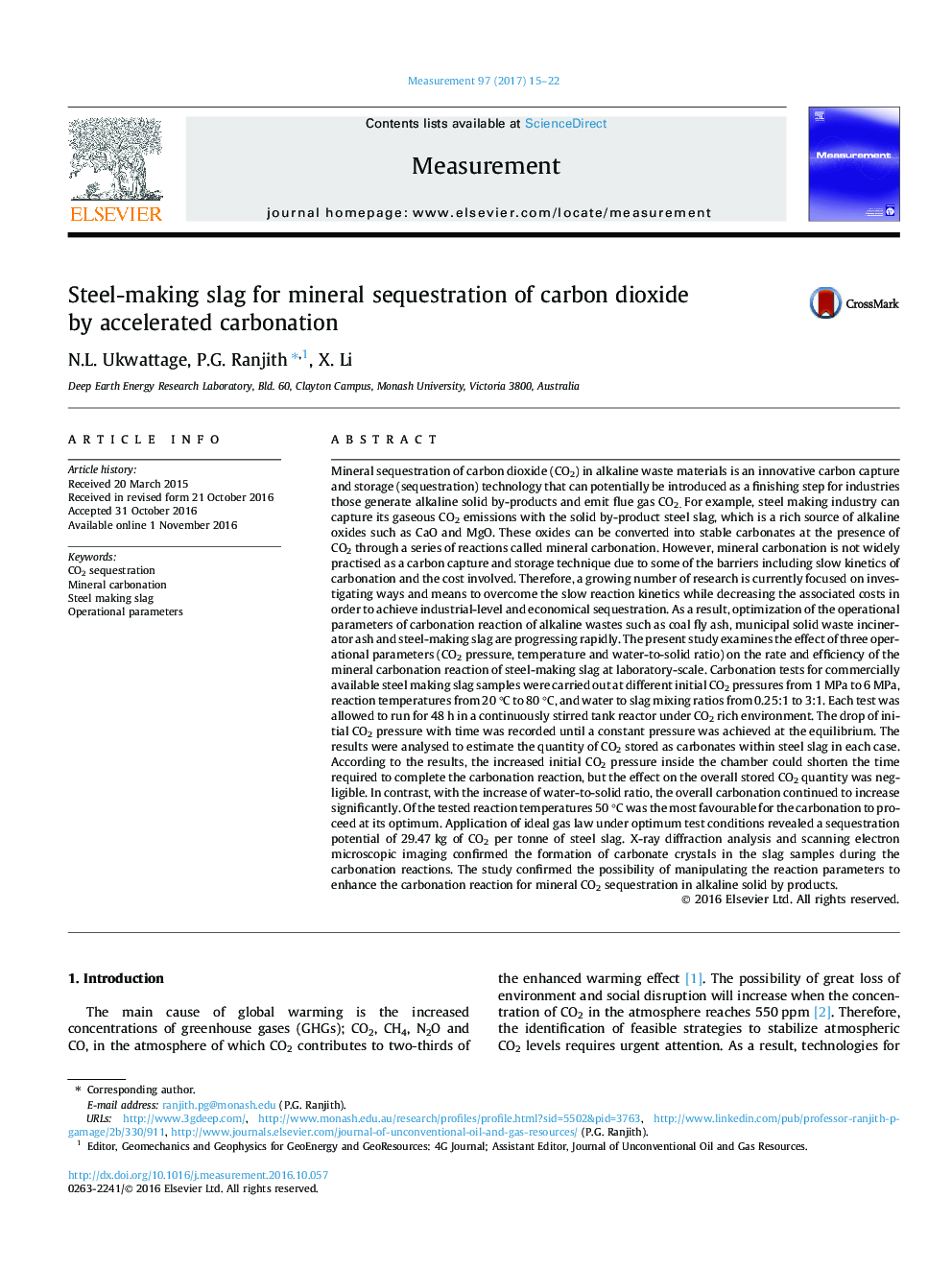| کد مقاله | کد نشریه | سال انتشار | مقاله انگلیسی | نسخه تمام متن |
|---|---|---|---|---|
| 5006896 | 1461490 | 2017 | 8 صفحه PDF | دانلود رایگان |
عنوان انگلیسی مقاله ISI
Steel-making slag for mineral sequestration of carbon dioxide by accelerated carbonation
ترجمه فارسی عنوان
سرباره فولادی برای تخریب دی اکسید کربن با کربناته سریع
دانلود مقاله + سفارش ترجمه
دانلود مقاله ISI انگلیسی
رایگان برای ایرانیان
کلمات کلیدی
موضوعات مرتبط
مهندسی و علوم پایه
سایر رشته های مهندسی
کنترل و سیستم های مهندسی
چکیده انگلیسی
Mineral sequestration of carbon dioxide (CO2) in alkaline waste materials is an innovative carbon capture and storage (sequestration) technology that can potentially be introduced as a finishing step for industries those generate alkaline solid by-products and emit flue gas CO2. For example, steel making industry can capture its gaseous CO2 emissions with the solid by-product steel slag, which is a rich source of alkaline oxides such as CaO and MgO. These oxides can be converted into stable carbonates at the presence of CO2 through a series of reactions called mineral carbonation. However, mineral carbonation is not widely practised as a carbon capture and storage technique due to some of the barriers including slow kinetics of carbonation and the cost involved. Therefore, a growing number of research is currently focused on investigating ways and means to overcome the slow reaction kinetics while decreasing the associated costs in order to achieve industrial-level and economical sequestration. As a result, optimization of the operational parameters of carbonation reaction of alkaline wastes such as coal fly ash, municipal solid waste incinerator ash and steel-making slag are progressing rapidly. The present study examines the effect of three operational parameters (CO2 pressure, temperature and water-to-solid ratio) on the rate and efficiency of the mineral carbonation reaction of steel-making slag at laboratory-scale. Carbonation tests for commercially available steel making slag samples were carried out at different initial CO2 pressures from 1 MPa to 6 MPa, reaction temperatures from 20 °C to 80 °C, and water to slag mixing ratios from 0.25:1 to 3:1. Each test was allowed to run for 48 h in a continuously stirred tank reactor under CO2 rich environment. The drop of initial CO2 pressure with time was recorded until a constant pressure was achieved at the equilibrium. The results were analysed to estimate the quantity of CO2 stored as carbonates within steel slag in each case. According to the results, the increased initial CO2 pressure inside the chamber could shorten the time required to complete the carbonation reaction, but the effect on the overall stored CO2 quantity was negligible. In contrast, with the increase of water-to-solid ratio, the overall carbonation continued to increase significantly. Of the tested reaction temperatures 50 °C was the most favourable for the carbonation to proceed at its optimum. Application of ideal gas law under optimum test conditions revealed a sequestration potential of 29.47 kg of CO2 per tonne of steel slag. X-ray diffraction analysis and scanning electron microscopic imaging confirmed the formation of carbonate crystals in the slag samples during the carbonation reactions. The study confirmed the possibility of manipulating the reaction parameters to enhance the carbonation reaction for mineral CO2 sequestration in alkaline solid by products.
ناشر
Database: Elsevier - ScienceDirect (ساینس دایرکت)
Journal: Measurement - Volume 97, February 2017, Pages 15-22
Journal: Measurement - Volume 97, February 2017, Pages 15-22
نویسندگان
N.L. Ukwattage, P.G. Ranjith, X. Li,
